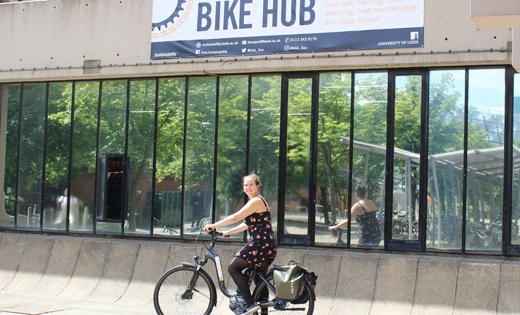Going the extra mile to cut air pollution
Teams across campus recently joined forces to engage colleagues about efforts to cut air pollution.
Thom Cooper, Sustainability Programme Officer, on the air quality monitoring walk

The Sustainability Service coordinated efforts on national Clean Air Day 2019 (Thursday 20 June) from the Bike Hub, Institute of Transport Studies, School of Earth and Environment and Great Food at Leeds to raise awareness of the issue across the city.
Activities on Clean Air Day 2019 included free electric bike trials, an air quality monitoring walk, free breakfasts for ‘active commuters’ and educating members of the public on air quality research in Leeds City Centre.
The free electric bike trails took place from the Bike Hub, with 15 colleagues taking the motor-assisted machines for a spin around campus. Electric bikes are increasingly being seen as part of the solution to decarbonise transport, as they are a popular option for getting around the city. The pedal-assist feature helps cyclists tackle those journeys deemed too far or too hilly (as is often the case in Yorkshire!) for conventional bicycles.
Electric bikes are available to hire from the Bike Hub for a one-month period, so colleagues can see the benefits for themselves.
 Sustainability Engagement Intern, Rosie Flett, takes one of the electric bikes for a spin
Sustainability Engagement Intern, Rosie Flett, takes one of the electric bikes for a spin
The air quality monitoring walk, led by Dr James Tate and Laura Kiely, gave staff the opportunity to measure particulate matter – particles suspended in air, many of which are hazardous, such as soot and smoke – across campus. The walk included both hotspot areas, such as Blenheim Terrace, and low-polluted sites, such as St George’s Field.
Particulate levels on the day were 20-30,000, with spikes by the roads of up to 200,000 – so, a particularly bad day on campus, despite it being Clean Air Day.
Data collected was uploaded to the Centre for Environmental Modelling and Computation (CEMAC) website, which is accessible to colleagues, students and external stakeholders for reference.
Thom Cooper, Sustainability Programme Officer with the Sustainability Service, organised the walk. He said: “It was great to engage a wide range of colleagues on the Living Lab Air Quality project, which has been running since November 2017.
“This has been one of the most successful Living Lab projects, building our knowledge on air quality and pollution to help shape and inform action that improves the environment and health of our stakeholders.”
Air pollution is considered the largest environmental risk to our health. Recent research from Leeds, amongst others, has shown it is causing an increase in lung and heart conditions, especially in children, as we inhale a mix of gases and particles that can pass into our blood and be transported around the body.
Leeds was highlighted as one of the five worst cities in the UK for air pollution in 2017. The report stated that, unless drastic changes were made, Leeds would exceed legal EU limits of air quality in 2020.
Leeds scientists are leading a research network of northern universities to find new ways to rapidly decarbonise UK transport. And we were one of the first organisations to sign the Clean Air Leeds pledge last year, demonstrating our commitment to improving air quality in the city. The pledge commits us to encouraging behavioural change at both organisational and individual level.
Clean Air Day 2019 was the start of coordinated activities across Leeds from a number of local organisations, under the branding #LetLeedsBreathe.
Visit the Sustainable Transport webpage for further information about how we are working towards the pledge and to find out how you can reduce air pollution in Leeds.
Posted in: University news